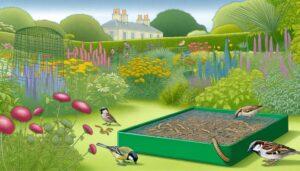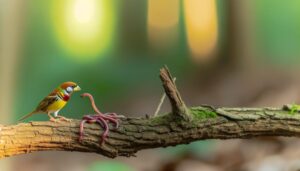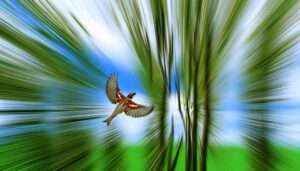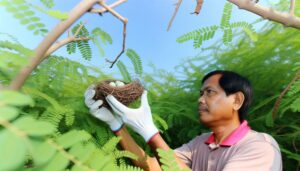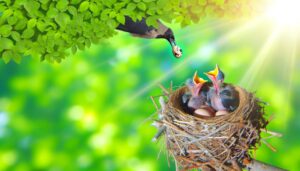How to Feed Sparrows Cheerios Safely
Feeding a sparrow Cheerios is not advisable due to various health risks and potential nutritional imbalances. Cheerios, while rich in essential nutrients for humans, may pose a choking hazard for small birds like sparrows.
The high sugar content and artificial additives can disrupt their delicate digestive systems and lead to obesity or metabolic disorders. Sparrows require a varied diet primarily consisting of seeds, grains, insects, and plant material for best health.
Limiting Cheerios to a minimal portion and frequency could mitigate risks, but relying on natural food sources is critical for their well-being. Learn further details about best sparrow feeding practices ahead.
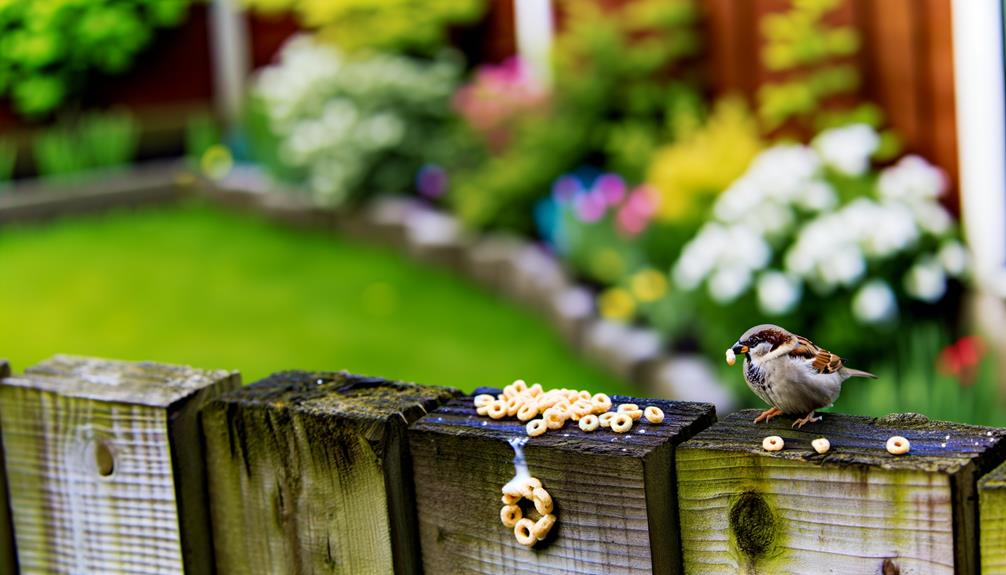
Key Takeaways
- Cheerios can be fed to sparrows in very small quantities and infrequently.
- Cheerios may pose a choking hazard; monitor sparrows when offering them.
- High sugar content in Cheerios can lead to obesity and metabolic disorders in sparrows.
- Sparrows require a varied diet with natural seeds, grains, insects, and fruits.
- Offering Cheerios should not replace the sparrow's natural food sources.
Nutritional Content of Cheerios
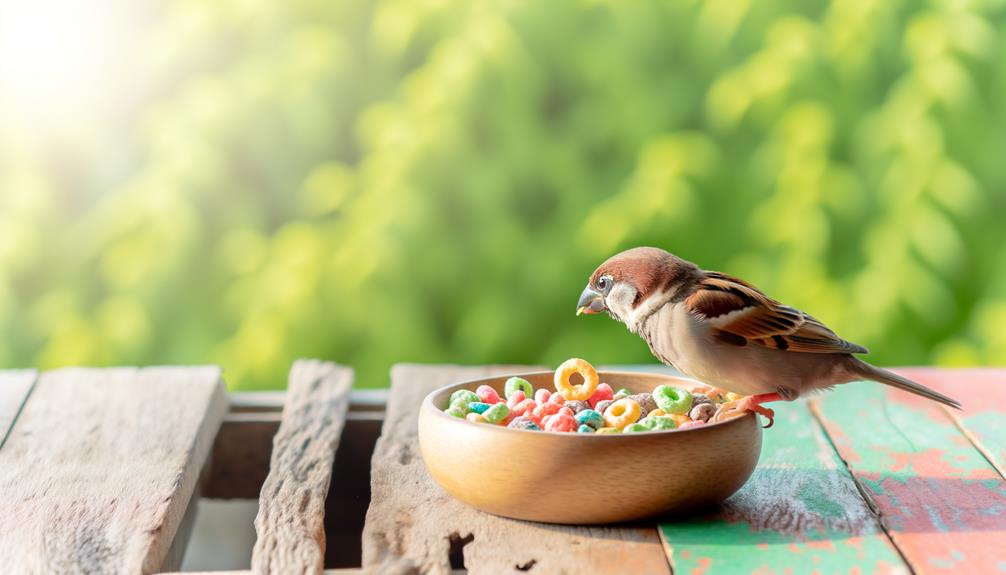
Cheerios, a popular breakfast cereal, primarily consists of whole grain oats, which provide a substantial source of carbohydrates, dietary fiber, and essential nutrients. Whole grain oats are rich in beta-glucan, a soluble fiber known for its cholesterol-lowering properties.
Additionally, Cheerios contain essential vitamins and minerals such as iron, vitamin D, and B vitamins (thiamine, riboflavin, niacin, and folic acid). The product is low in sugar and fat, making it a relatively healthy option for human consumption.
However, its sodium content, while moderate for humans, must be considered when evaluating its suitability for other species. The nutritional profile of Cheerios suggests a balanced intake of macronutrients and micronutrients, essential for maintaining health and wellbeing.
Sparrow Dietary Needs
Understanding the dietary needs of sparrows is vital for ensuring their health and well-being.
Sparrows primarily consume a variety of natural foods, including seeds, insects, and plant material, which provide essential nutrients such as proteins, fats, vitamins, and minerals.
Evaluating the compatibility of commercial foods like Cheerios with these nutritional requirements is important for determining their suitability as a part of a sparrow's diet.
Natural Food Sources
Sparrows mainly rely on a variety of natural food sources including seeds, grains, insects, and small fruits to meet their dietary needs. These avian species show a diverse foraging behavior that allows them to adapt to different environments.
Seeds and grains make up the majority of their diet, providing vital carbohydrates and proteins. During breeding seasons, their diet shifts towards a higher intake of insects such as caterpillars, beetles, and spiders, which provide the necessary proteins for growing chicks. Additionally, small fruits like berries offer vitamins and antioxidants.
This varied diet ensures that sparrows obtain a balanced array of nutrients, facilitating their survival and reproductive success. Understanding these natural dietary habits is important for anyone considering supplemental feeding.
Nutritional Requirements
A thorough understanding of the nutritional requirements of sparrows reveals that their diet must encompass a balanced intake of proteins, carbohydrates, fats, vitamins, and minerals to support their overall health and reproductive success.
Proteins, derived from insects and seeds, are important for muscle development and feather quality.
Carbohydrates, primarily from grains and seeds, provide essential energy for daily activities.
Fats, found in seeds and insects, are important for energy storage and insulation.
Essential vitamins, such as A, D, and E, along with minerals like calcium and phosphorus, ensure proper metabolic function and bone health.
An imbalanced diet can lead to malnutrition, affecting growth, immune response, and reproductive capabilities. Thus, a varied diet closely mimicking their natural food sources is ideal.
Safety Concerns
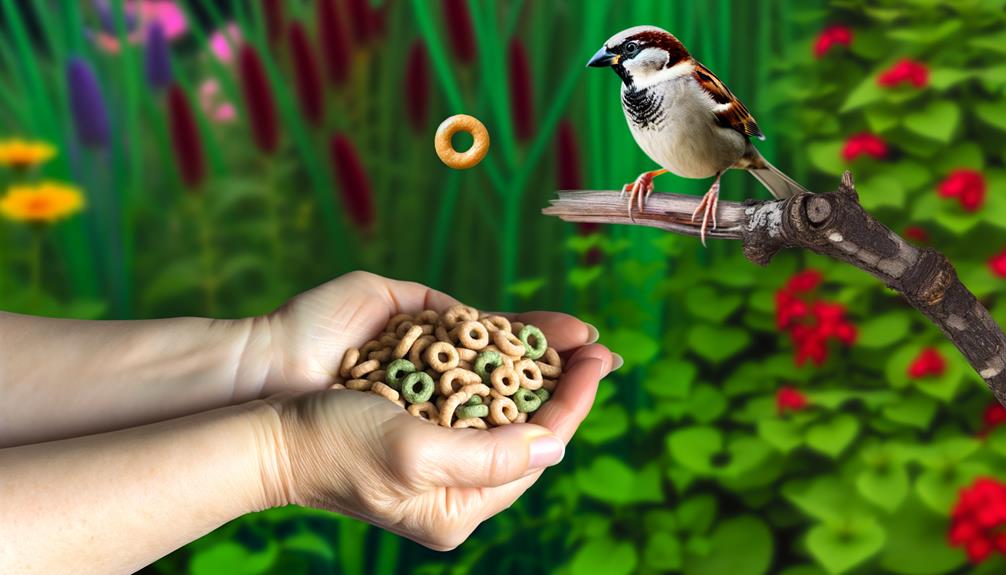
When considering the dietary supplementation of sparrows with Cheerios, it is crucial to evaluate the potential safety risks associated with this practice.
First, the size and hardness of Cheerios may pose a choking hazard for small birds, particularly fledglings and juvenile sparrows.
In addition, the addition of artificial additives, preservatives, and high sugar content in commercial cereals could lead to adverse reactions. Cross-contamination with allergens during production might also present hidden dangers.
Finally, sparrows are adapted to a natural diet, and introducing processed foods can disrupt their digestive systems.
As a result, while Cheerios may seem benign, their safety as a bird food must be scrutinized meticulously to avoid unintended consequences.
Potential Health Risks
The introduction of Cheerios into the diet of sparrows may pose several potential health risks that warrant thorough investigation. While Cheerios are generally considered safe for human consumption, their impact on sparrows' health can be more complex.
Key concerns include:
- Nutritional Imbalance: Cheerios may lack essential nutrients specific to sparrow diets, leading to deficiencies.
- High Sugar Content: Some varieties contain added sugars, which can contribute to obesity and metabolic disorders in birds.
- Additives and Preservatives: Certain ingredients may be harmful or toxic to sparrows even in small quantities.
- Digestive Issues: The grain composition of Cheerios might cause digestive disturbances, given birds' specialized gastrointestinal systems.
Understanding these risks is vital for making informed decisions about feeding practices.
Moderation and Portions
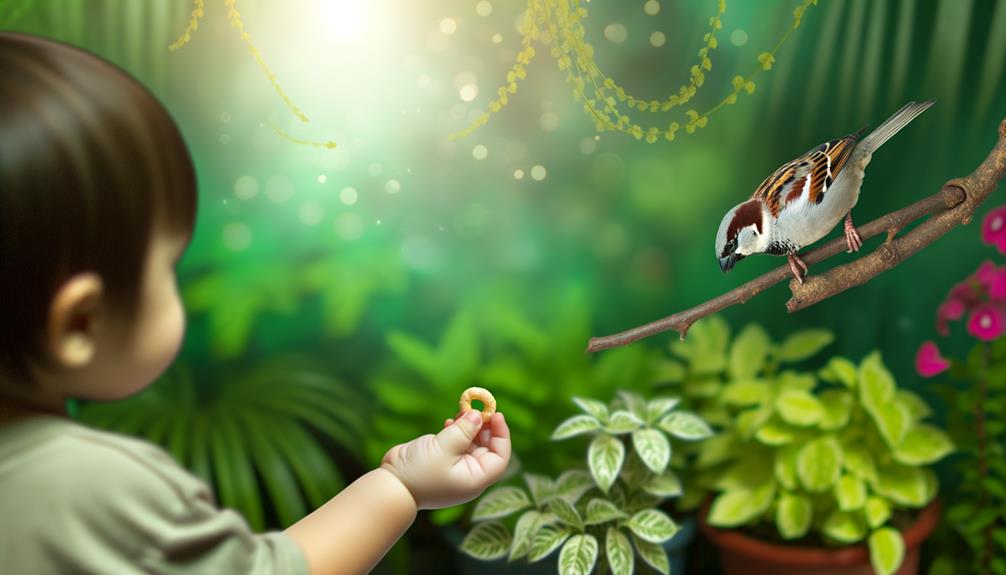
When considering feeding Cheerios to sparrows, it is important to address the appropriate serving size, frequency of feeding, and the overall nutritional balance. Providing Cheerios as an occasional treat rather than a primary food source guarantees that the sparrow's diet remains nutritionally adequate.
Careful attention to portion control and feeding intervals can mitigate the risk of adverse health effects while maintaining dietary diversity.
Appropriate Serving Size
Understanding the appropriate serving size for feeding a sparrow Cheerios is crucial to safeguarding the bird's health and well-being. Overfeeding can lead to nutritional imbalances and health issues.
Here are key guidelines to determine the proper portion:
- Size of Cheerios: Break Cheerios into smaller pieces to avoid choking hazards.
- Quantity: Provide no more than one to two small pieces per feeding session.
- Supplemental Feeding: Cheerios should only be a minor part of the sparrow's diet, supplemented with natural seeds and insects.
- Observation: Monitor the sparrow's behavior and health after feeding to make sure it is not negatively impacted.
Following these guidelines will help maintain a balanced and healthy diet for your feathered friend.
Frequency of Feeding
Determining the frequency of feeding Cheerios to a sparrow requires careful consideration of moderation and appropriate portion sizes to safeguard the bird's overall nutritional health.
Ideally, Cheerios should be offered as an occasional treat rather than a staple food. Limiting the frequency to once or twice a week, with each serving consisting of no more than a few small pieces, can help prevent potential nutritional imbalances.
Overconsumption of Cheerios, which lack essential nutrients found in a sparrow's natural diet, may lead to health issues such as obesity or malnutrition. Hence, it is essential to make sure that Cheerios are given sparingly and in conjunction with a diet rich in seeds, insects, and other natural food sources.
Nutritional Balance
Achieving a proper nutritional balance for a sparrow requires careful moderation and precise portion control when incorporating non-traditional foods like Cheerios into their diet. While Cheerios can be a source of carbohydrates, their nutritional profile does not align perfectly with a sparrow's natural food sources. It is crucial to make sure that Cheerios do not constitute a significant portion of the diet.
To maintain a balanced diet:
- Limit Cheerios to occasional treats: No more than once a week.
- Portion control: Offer only small pieces, less than a quarter of a Cheerio per feeding.
- Supplement with natural foods: Provide ample seeds, insects, and fruits.
- Monitor health: Regularly observe the sparrow for any adverse effects.
This approach guarantees nutritional adequacy and minimizes potential health risks.
Alternative Treats
Exploring different treats for sparrows can offer a diverse range of nutrients and stimulate their natural foraging behavior. These treats should be chosen based on their nutritional profile to guarantee they meet the dietary needs of sparrows. Common alternatives include seeds, fruits, and insects. Seeds like millet and sunflower seeds provide essential fats and proteins, while fruits such as berries offer vitamins and antioxidants. Insects, including mealworms, provide high-quality protein and mimic sparrows' natural diet.
| Alternative Treat | Nutritional Benefits |
|---|---|
| Millet Seeds | Rich in protein and essential fats |
| Berries | Abundant in vitamins and antioxidants |
| Mealworms | Outstanding source of high-quality protein |
Supplying a variety of treats guarantees a balanced diet and promotes overall health.
Observing Sparrow Behavior
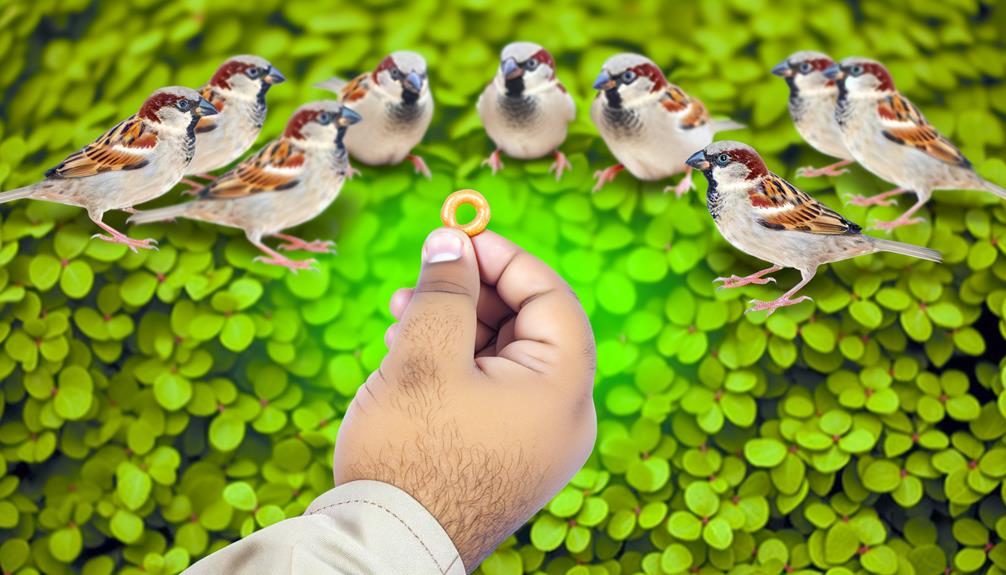
To fully understand the impact of various treats on sparrows' health, it is imperative to closely observe their behavior and interactions during feeding. Detailed observation helps identify immediate reactions and preferences.
Key behaviors to monitor include:
- Feeding Frequency: How often sparrows choose Cheerios over other food options.
- Aggression Levels: Any increase in aggressive interactions among sparrows during feeding times.
- Consumption Rate: The speed at which Cheerios are consumed compared to natural foods.
- Physical Health Indicators: Changes in plumage, weight, or activity levels following Cheerios consumption.
These observations provide valuable data on the suitability of Cheerios as a dietary supplement for sparrows, allowing for a nuanced understanding of their immediate effects.
Long-term Effects
Evaluating the long-term effects of feeding sparrows Cheerios requires a detailed examination of potential health implications and behavioral changes over an extended period. Regular consumption of processed foods like Cheerios can lead to nutritional imbalances, as sparrows may not receive essential nutrients found in their natural diet.
High sugar and sodium content in Cheerios could contribute to obesity, metabolic disorders, and cardiovascular issues in sparrows. Moreover, reliance on easily accessible human food might alter their foraging behavior, reducing their ability to thrive in natural environments.
Continuous research and monitoring are necessary to fully understand the repercussions on their health and ecological habits. It is important to take these factors into account when deciding on feeding habits.
Best Feeding Practices
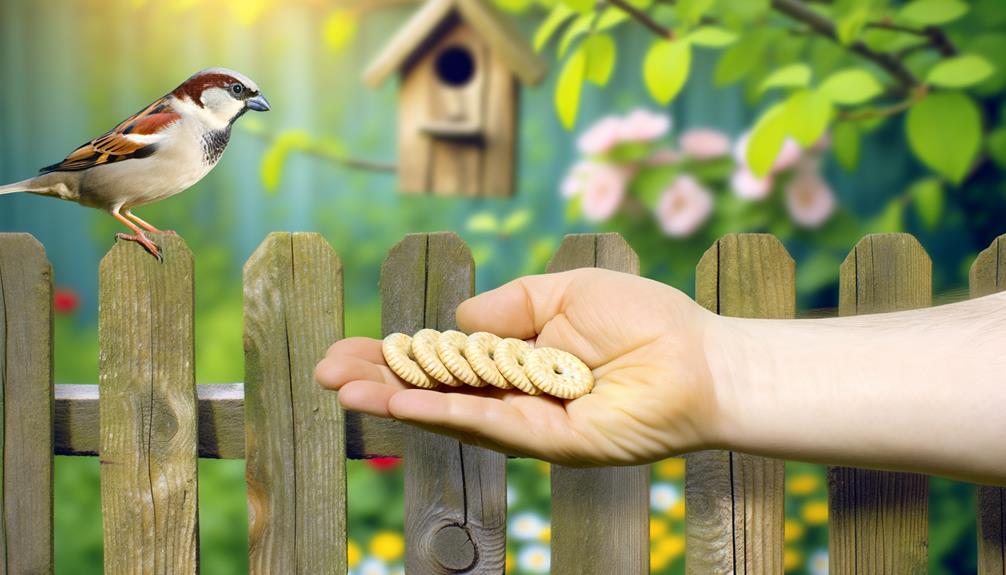
Implementing top feeding practices for sparrows necessitates a thorough understanding of their dietary needs and natural foraging behaviors. Sparrows primarily consume seeds, grains, and small insects, which provide essential nutrients for their health and vitality.
To ensure prime nutrition, consider the following guidelines:
- Seed Mixes: Offer a high-quality seed mix specifically formulated for small birds, which typically includes millet, sunflower seeds, and cracked corn.
- Supplemental Foods: Introduce mealworms or other small insects to mimic their natural diet and provide additional protein.
- Fresh Water: Guarantee a consistent supply of clean, fresh water for drinking and bathing.
- Feeding Frequency: Provide food in moderate amounts, replenishing as needed to avoid spoilage and attract a variety of birds.
These practices support the well-being of sparrows, promoting a balanced diet and healthy ecosystem.
Conclusion
In the vibrant world of sparrows, each fluttering wing and chirping note speaks to a life finely attuned to nature's provisions. While Cheerios may not immediately endanger these delicate creatures, the nutritional imbalance and potential health risks they pose cannot be overlooked.
Moderation and alternative treats are crucial to maintaining the health of these small aviators. Observing their behavior and following best feeding practices guarantees their continued harmony within their natural habitat.


